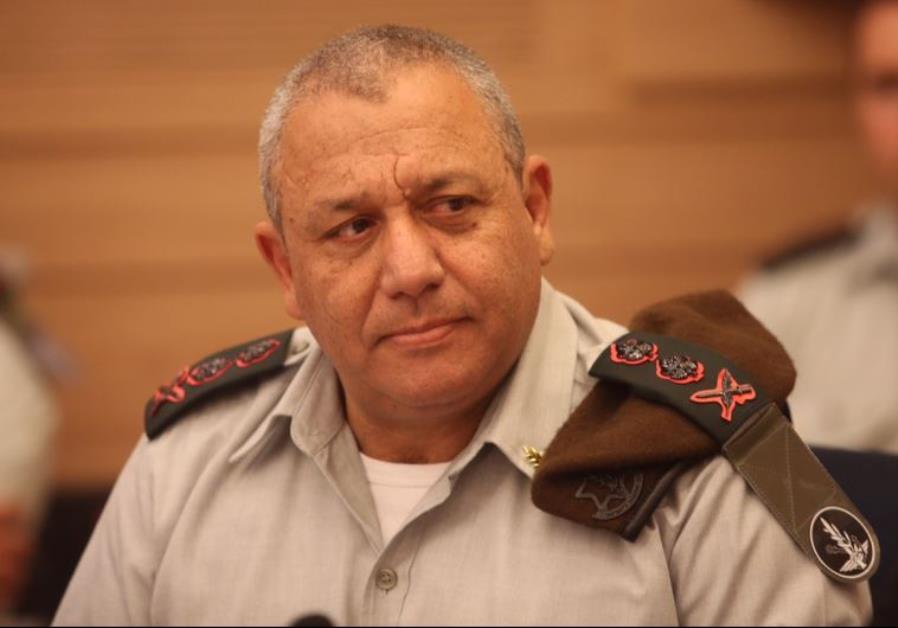Eisenkot: Israel and Hezbollah almost went to war during my tenure

IDF chief of staff Lt.-Gen. Gadi Eisenkot appears at a hearing of the Knesset Foreign Affairs and Defense Committee. (photo credit: MARC ISRAEL SELLEM)
Israel and Hezbollah almost went to war on more than one occasion during his tenure from February 2015 to this January, former IDF Chief of Staff Lt.-Gen. (res.) Gadi Eisenkot said Monday.
“There were not a few instances and days where the distance between those events and escalation to the point of war or battle was a hair’s breadth,” he said at the Meir Dagan Conference for Security and Strategy, held at the Netanya Academic College.
Eisenkot said that the Lebanese Shi’ite terror group had plans to send 5,000 militants into Israel using their cross-border tunnels while simultaneously pounding the Jewish State with rocket fire as part of the group’s “Conquer the Galilee” plan.
“Hezbollah had grandiose plans to surprise Israel by bringing 5,000 fighter into Israel by their underground tunnels, while firing rockets at us,” he said. “But this plan was not implemented. It was identified by us four years ago, and we dealt with it two months ago, while at the same time continuing to harm their abilities to produce precise weapons,” he continued, referring to the IDF’s Operation Northern Shield which detected and destroyed several cross-border tunnels dug by the Lebanese terror group into northern Israel.
Israel launched Operation Northern Shield in early December and destroyed at least four cross-border tunnels, two by explosives and two others by flooding with liquid concrete. The IDF declared the end of the operation in mid-January, saying that it had “deprived Hezbollah of the unique offensive abilities it had built for years as part of its planned attack on Israeli territory.”
While the military announced the end of the operation, it noted that it “is simultaneously monitoring several locations where Hezbollah is digging underground structures which have yet to cross into Israel.”
It will also continue a “broad defense effort” along the Lebanese border to ensure that Hezbollah does not try to dig future tunnels into Israel by integrating various means such a the ongoing construction of the border wall with Lebanon.
Israel and Hezbollah last fought a war – the Second Lebanon War – in 2006, and has since then morphed from a guerrilla group to an army with a set hierarchy and procedures. With the help of Iran, it has rebuilt its arsenal since 2006 and has hundreds of thousands of short-range rockets and several thousand more missiles that can reach deeper into Israel.
According to Eisenkot, while Hezbollah “is a serious threat” which has gained battlefield experience, it is not the only threat facing Israel.
“Today, Israel is facing four ‘circles’ of threats – three of them historical, and one of them new. The threat of unconventional weapons has been somewhat dulled by the nuclear agreement signed between Iran and the West, but there is no doubt that it is the first threat facing us,” he said.
“The second threat, the conventional threat which keeps the IDF busy, has dulled somewhat due to peace agreements. The third threat, which worries my generation of commanders, is a unconventional threat – guerrilla warfare.”
The fourth threat, Eisenkot said, was cybersecurity which has in recent years grown to become “a significant threat which will occupy us more and more in the future.”
According to the former chief of staff, Israel’s security challenges are “a huge iceberg” with the tip being the challenges in the West Bank and Gaza, “which every Israeli citizen sees.” while the larger “hidden part is Iran’s efforts to acquire nuclear weapons and attain regional hegemony, their advanced military infrastructure and their rocket abilities.”
While the usual term for chief of staff is three years, Eisenkot served as the top military officer in the IDF for four years until January after former Defense Minister Avigdor Liberman extended his term in January 2017.
He will officially leave the military on March 31, and will join the Washington Institute for Near East Policy.
Join Jerusalem Post Premium Plus now for just $5 and upgrade your experience with an ads-free website and exclusive content. Click here>>






Comments are closed.